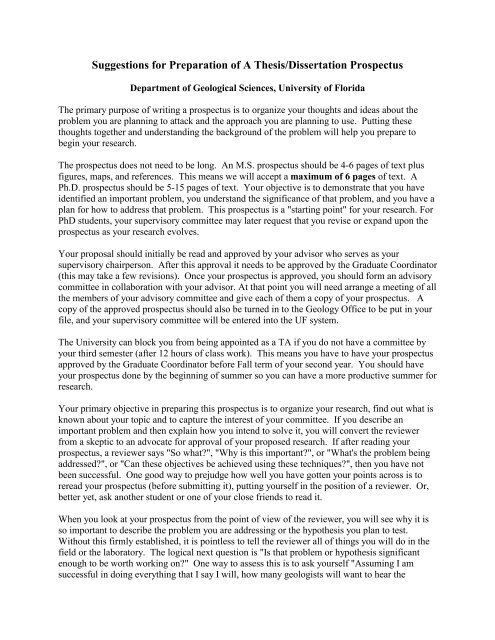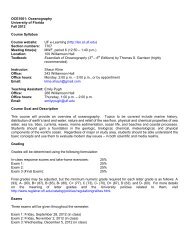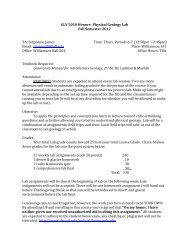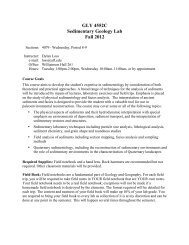Guide to writing a thesis/dissertation prospectus - Department of ...
Guide to writing a thesis/dissertation prospectus - Department of ...
Guide to writing a thesis/dissertation prospectus - Department of ...
You also want an ePaper? Increase the reach of your titles
YUMPU automatically turns print PDFs into web optimized ePapers that Google loves.
Suggestions for Preparation <strong>of</strong> A Thesis/Dissertation Prospectus<strong>Department</strong> <strong>of</strong> Geological Sciences, University <strong>of</strong> FloridaThe primary purpose <strong>of</strong> <strong>writing</strong> a <strong>prospectus</strong> is <strong>to</strong> organize your thoughts and ideas about theproblem you are planning <strong>to</strong> attack and the approach you are planning <strong>to</strong> use. Putting thesethoughts <strong>to</strong>gether and understanding the background <strong>of</strong> the problem will help you prepare <strong>to</strong>begin your research.The <strong>prospectus</strong> does not need <strong>to</strong> be long. An M.S. <strong>prospectus</strong> should be 4-6 pages <strong>of</strong> text plusfigures, maps, and references. This means we will accept a maximum <strong>of</strong> 6 pages <strong>of</strong> text. APh.D. <strong>prospectus</strong> should be 5-15 pages <strong>of</strong> text. Your objective is <strong>to</strong> demonstrate that you haveidentified an important problem, you understand the significance <strong>of</strong> that problem, and you have aplan for how <strong>to</strong> address that problem. This <strong>prospectus</strong> is a "starting point" for your research. ForPhD students, your supervisory committee may later request that you revise or expand upon the<strong>prospectus</strong> as your research evolves.Your proposal should initially be read and approved by your advisor who serves as yoursupervisory chairperson. After this approval it needs <strong>to</strong> be approved by the Graduate Coordina<strong>to</strong>r(this may take a few revisions). Once your <strong>prospectus</strong> is approved, you should form an advisorycommittee in collaboration with your advisor. At that point you will need arrange a meeting <strong>of</strong> allthe members <strong>of</strong> your advisory committee and give each <strong>of</strong> them a copy <strong>of</strong> your <strong>prospectus</strong>. Acopy <strong>of</strong> the approved <strong>prospectus</strong> should also be turned in <strong>to</strong> the Geology Office <strong>to</strong> be put in yourfile, and your supervisory committee will be entered in<strong>to</strong> the UF system.The University can block you from being appointed as a TA if you do not have a committee byyour third semester (after 12 hours <strong>of</strong> class work). This means you have <strong>to</strong> have your <strong>prospectus</strong>approved by the Graduate Coordina<strong>to</strong>r before Fall term <strong>of</strong> your second year. You should haveyour <strong>prospectus</strong> done by the beginning <strong>of</strong> summer so you can have a more productive summer forresearch.Your primary objective in preparing this <strong>prospectus</strong> is <strong>to</strong> organize your research, find out what isknown about your <strong>to</strong>pic and <strong>to</strong> capture the interest <strong>of</strong> your committee. If you describe animportant problem and then explain how you intend <strong>to</strong> solve it, you will convert the reviewerfrom a skeptic <strong>to</strong> an advocate for approval <strong>of</strong> your proposed research. If after reading your<strong>prospectus</strong>, a reviewer says "So what?", "Why is this important?", or "What's the problem beingaddressed?", or "Can these objectives be achieved using these techniques?", then you have notbeen successful. One good way <strong>to</strong> prejudge how well you have gotten your points across is <strong>to</strong>reread your <strong>prospectus</strong> (before submitting it), putting yourself in the position <strong>of</strong> a reviewer. Or,better yet, ask another student or one <strong>of</strong> your close friends <strong>to</strong> read it.When you look at your <strong>prospectus</strong> from the point <strong>of</strong> view <strong>of</strong> the reviewer, you will see why it isso important <strong>to</strong> describe the problem you are addressing or the hypo<strong>thesis</strong> you plan <strong>to</strong> test.Without this firmly established, it is pointless <strong>to</strong> tell the reviewer all <strong>of</strong> things you will do in thefield or the labora<strong>to</strong>ry. The logical next question is "Is that problem or hypo<strong>thesis</strong> significantenough <strong>to</strong> be worth working on?" One way <strong>to</strong> assess this is <strong>to</strong> ask yourself "Assuming I amsuccessful in doing everything that I say I will, how many geologists will want <strong>to</strong> hear the
esults.?" If you conclude "Not many", then you need <strong>to</strong> rethink why you chose the project, andexplain its importance more convincingly. If you feel that you single-handily need <strong>to</strong> solve themost pressing problems in geology, the scope <strong>of</strong> any project must be limited <strong>to</strong> what can berealistically accomplished. But do concern yourself about how your results will contribute <strong>to</strong> thesolution <strong>of</strong> a fundamental problem in your discipline, or why your field area is ideal foraddressing a significant regional or <strong>to</strong>pical problem.Once you have established the significance <strong>of</strong> your project, specify what you will do (i.e., yourresearch strategy). Make sure you explain <strong>to</strong> the reviewer how these steps will lead you <strong>to</strong>answers <strong>to</strong> the questions you have set out <strong>to</strong> solve. This is the time <strong>to</strong> provide details; don't leaveit <strong>to</strong> a reviewer <strong>to</strong> decide whether your research plan will answer the questions. Tell the reviewerhow it will.<strong>Guide</strong>lines for the <strong>prospectus</strong> are listed below.THESIS/DISSERTATION PROSPECTUS GUIDELINES1) Title Page:This section should include title, supervisors name, your name, date, and space for youradvisor and a member <strong>of</strong> the graduate committee <strong>to</strong> sign.2) Project SummaryOne (for M.S.) <strong>to</strong> two (for PhD) paragraph summary <strong>of</strong> your proposed project.3) IntroductionBrief introduction <strong>to</strong> the <strong>to</strong>pic/area that you plan <strong>to</strong> study. What are the big questions inyour <strong>to</strong>pic area, why are they important, and what gap does your research fill? End theintroduction with a brief statement summarizing your proposed research.4) BackgroundThis section should focus on what is known (literature survey). This can be backgroundon your research method and your field area (if appropriate). What work has previouslybeen done on these methods or this area? Why is the field area selected appropriate foryour research?5) Questions <strong>to</strong> be addressed/ Hypotheses <strong>to</strong> be tested:These should not be the specific data you'll collect (those will go in the "Research Plan"),but instead describe the science questions that your research will answer or the specifichypo<strong>thesis</strong> that the research will test.6) Research Plan:This section should include types <strong>of</strong> data <strong>to</strong> be collected, how the data will be collected(analytical methodologies, field work, modeling) , and how long it will take <strong>to</strong> collect thedata. Be sure <strong>to</strong> explain how the data collected will be used <strong>to</strong> answer thequestions/test your hypotheses. If your <strong>thesis</strong> is part <strong>of</strong> a larger project (such as an
advisor's NSF project), specify what aspects <strong>of</strong> the research you will do, and what partsothers will do.7) Research Time-line and Funding:An estimate <strong>of</strong> the time need <strong>to</strong> complete the major tasks discussed above. Include andestimate <strong>of</strong> when you plan <strong>to</strong> submit a first draft <strong>of</strong> your <strong>thesis</strong> and an estimated time foryour defense. Keep in mind the strict dates for submission and defenses dictated by theGraduate School. Indicate funding sources for the research and your stipend during yourresearch.Once you have written your <strong>prospectus</strong>:1) Reread it and then rewrite it!2) Have fellow students read it and critique it for you.3) Have your advisor read it and then rewrite it according <strong>to</strong> his/her comments. The copy yousubmit <strong>to</strong> the Graduate Coordina<strong>to</strong>r must have your supervisor’s signature on it <strong>to</strong>demonstrate that he/she has read it and approved it.Once your <strong>prospectus</strong> is approved:1) Make a copy <strong>of</strong> the signed version and bring it <strong>to</strong> the Geology Office for your file.2) Meet with your advisor and finalize your list <strong>of</strong> potential supervisory committee members.3) Contact all your potential committee members, give them a copy <strong>of</strong> your <strong>prospectus</strong>, andensure that they are willing <strong>to</strong> serve on the committee.4) Go <strong>to</strong> the Geology <strong>of</strong>fice, where your Supervisory Committee information will be enteredonline. This is essential! It needs <strong>to</strong> be done before the end <strong>of</strong> your second semester.5) Schedule a supervisory committee meeting <strong>to</strong> discuss your plans and progress. You shouldmeet with your committee once a year. This is an excellent opportunity <strong>to</strong> get feedbackfrom faculty other than your advisor. If you put someone on your committee and then handhim/her a <strong>thesis</strong> 2 years later, you will lose out on a lot <strong>of</strong> useful input.







